#angolan independence
Explore tagged Tumblr posts
Note
Your grandma is older than Israel?

Well, my grandma is older than all of these countries! And this doesn't even count most of the ones that existed as independent states before having to become independent again!
hi, i just saw your post about the precedence of ppl talking as if 2000 yrs caused jewish indigeniety to expire, and it made me think of the slogan "israel is younger than my grandma". it's an annoying phrase on its own because there are a lot of living grandmas older than a lot of different countries bc the 20th century has been a wild ride of geopolitical turbulence, but the desperation behind it betrays a kind of "it's not too late" energy - showing that these people have totally given up on decolonizing america, canada, australia, nz, and the other settler states they say they hate exactly as much as israel, but don't put a fraction of the energy into marching against. at most they're further down the revolutionary list, but at worst they're fully setting the expiration on indigenous rights to the age of a currently living grandma
Exactly this.
Palestine has been around just as long as Israel has as brittish mandate Palestine was a different country to Palestine. It was seen as a temporary extension of the brittish empire till they figured out what to do with it.
Like South Sudan became it's own country in 2011, Kosovo in 2008 and so many other countries. Even in the middle east, Yemen became it's own country in 1990. My parents are older than Yemen. I'm older than South Sudan and Kosovo.
And you are exactly right that they've given up on settler states they claim to hate so much. Like I've said in other posts, they don't give two shits about Māori rights. I haven't heard anyone outside of NZ talk about the bill David Seymour wants to implement. B'H that literally every single other party in Parliment, both in the government and opposition (so 5 parties and one independent) refuse to support his bill.
#☝��🤓#my aunt was literally born in Portuguese Angola! clearly this means Angolans were wrong to want independence and really we should just#reinstate the Portuguese colonial empire!!1! (sarcasm)
282 notes
·
View notes
Text
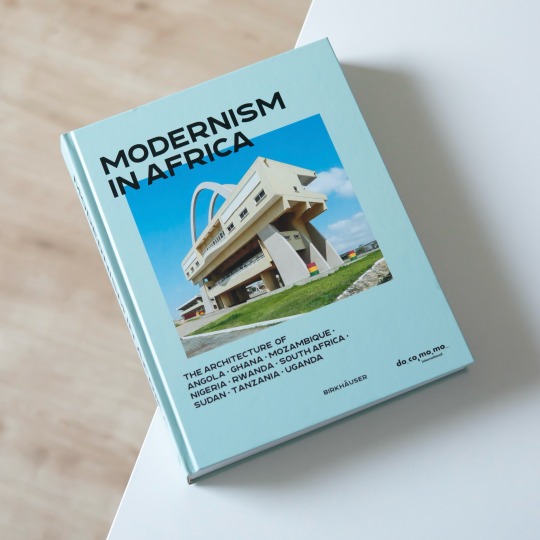

For way too long the modern architecture of Africa has been neglected by the Global North and only in recent years have substantial publications shed light on the fascinating architectural heritage in Africa. Late last year Birkhäuser added another comprehensive publication to the list of significant publications focusing on African modernism: "Modernism in Africa: The Architecture of Angola, Ghana, Mozambique, Nigeria, Rwanda, South Africa, Sudan, Tanzania, Uganda“, edited by docomomo international. The volume’s focus lies on educational buildings but not exclusively since also other remarkable structures are included. The reason for the dominant representation of educational buildings is their catalytic meaning for Africa as they were pivotal for the development of the continent. Following the consecutive independence and decolonization of numerous countries, schools, universities and other facilities were key components in their nation building processes. At the same time they marked a significant move away from the earlier colonial and missionary education to education that was available for all. From the early beginnings of school-building programs in the Gold Coast (i.e. Ghana) to the post-independence, internationally aided programs of the 1960s and 1970s a large number of remarkable buildings of primary and higher education were designed throughout the continent.
A significant factor influencing African architecture is the climate that naturally calls for climate-responsive designs. In her comprehensive essay Ana Tostoes addresses this aspect and based on the examples of Angola and Mozambique demonstrates how architectural programs were adapted to the local climates. As Portuguese colonies that gained independence only after the Carnation Revolution in Portugal in 1974, both Portugal and Brazil were reference points for architecture in Angola and Mozambique. The Ministry of Health and Education in Rio de Janeiro, designed by Oscar Niemeyer, Lucio Costa and Le Corbusier, was a broadly received example for tropical modern architecture that also introduced Le Corbusier whose work had a major impact on Angolan architecture in particular.
In view of the profoundness of the book and the many stellar examples of architecture presented in Jean Molitor’s photographs I can only provide a sketch of what readers can expect form the book but it is a highly and wholeheartedly recommended read!
71 notes
·
View notes
Text
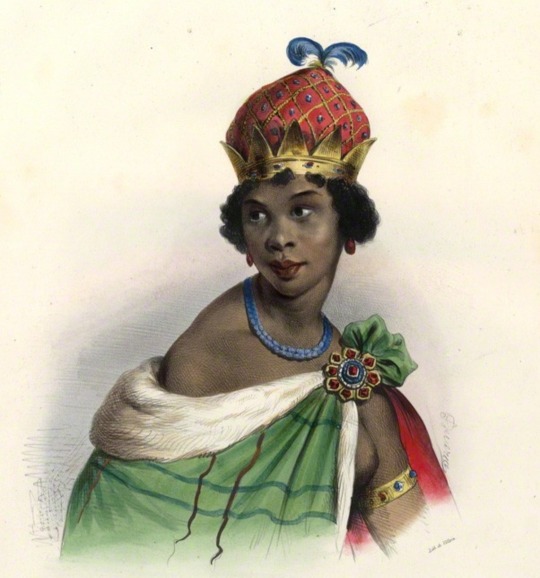
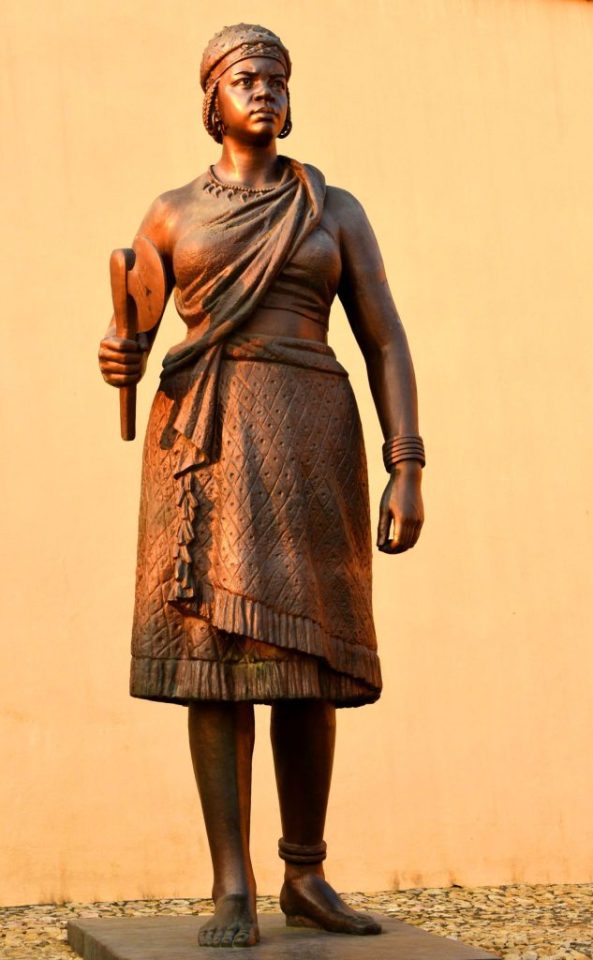
Queen Nzinga (c. 1583–1663) was a powerful and influential ruler of the Kingdom of Ndongo and Matamba, located in present-day Angola. Born in the late 16th century, Nzinga is best known for her determined resistance to Portuguese colonial expansion and the transatlantic slave trade. She ruled as queen of Ndongo and later as regent of Matamba, two powerful African kingdoms that resisted Portuguese attempts to control the region.
Nzinga's rise to power began when she was appointed as an ambassador to the Portuguese in 1622. During a diplomatic meeting, she famously refused to sit on the floor while negotiating with the Portuguese governor, symbolizing her strength and defiance against colonial power. Her intelligence, strategic brilliance, and fierce independence soon made her a formidable adversary to the Portuguese.
Nzinga led military campaigns against the Portuguese, forming alliances with other African kingdoms and European powers such as the Dutch, in a fight to maintain her kingdoms' sovereignty. Her leadership and resilience made her a national heroine in Angola, and she was particularly known for her guerrilla warfare tactics and political cunning.
Despite her struggles, Nzinga's kingdoms were eventually overrun by Portuguese forces. She died in 1663, at around 80 years old, after having spent much of her life defending her people's freedom and sovereignty. Nzinga's death marked the end of her direct resistance to Portuguese colonialism, but her legacy endured. She is remembered as a symbol of African resistance, leadership, and the strength of women in the face of imperialism.
Her death was followed by the continued colonization of Angola by the Portuguese, but her story remains a cornerstone of Angolan national pride. Queen Nzinga's name is still celebrated today as a figure of resilience, power, and determination in the face of colonial oppression. 🇦🇴
#black people#black history#black#blacktumblr#black tumblr#pan africanism#black conscious#africa#black power#black empowering#Queen Nzinga#african queen#african culture#african history#angola
98 notes
·
View notes
Text
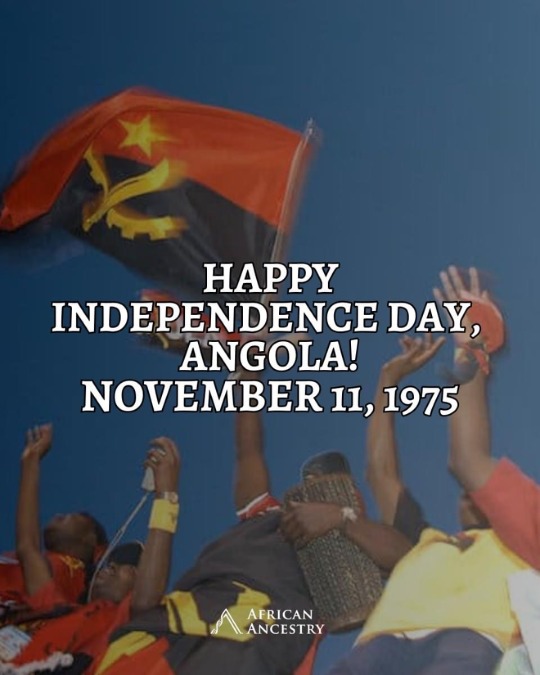
Happy Independence Day to our Angolan Fam! 🇦🇴✊🏾 Today, we honor Angola’s spirit and celebrate the resilience and achievements of its people. Here are a few things you may not know about Angola:
🇦🇴 Angola gained its independence from Portugal in 1975, marking a powerful moment in history.
🇦🇴 The awe-inspiring Kalandula Falls is one of Africa’s largest waterfalls—an incredible sight and part of Angola’s natural beauty.
🇦🇴 Angola’s semba music has deep roots and has even inspired the rhythms of samba in Brazil.
🇦🇴 Known as the “Paris of Africa,” Luanda’s energy and architecture tell stories of Angolan strength and progress.
Join us in celebrating Angola’s place in our shared African legacy! 🖤
#AngolaIndependence #AfricanAncestryFamily #MakeTheConnection
43 notes
·
View notes
Photo

Portuguese Angola
Portuguese Angola in southwest Africa was the first European colony on that continent. While settlement from 1571 proved problematic in the interior, the Portuguese did obtain a large number of slaves which they shipped to their Atlantic island colonies and to Portuguese Brazil right up to the end of the Atlantic slave trade in the 19th century.
With the capital at Luanda on the coast, the Portuguese struggled against the kingdoms of Kongo, Ndongo, and Matamba to gain control of the interior. The Angolan Wars saw shifting tribal allegiances thwart the relatively small number of Afro-Portuguese, but help from Brazil, eager to maintain the flow of slaves, proved crucial. The decolonization process in the mid-20th century was one of the most bloody and shambolic in Africa, and civil war continued long after independence was gained in 1975.
The Portuguese in West Africa
The Portuguese arrived in West Africa, and from the late 15th century they began to explore further south. Following the Portuguese colonization of São Tomé and Principe in 1486, the Europeans were looking for slaves to work on their sugar plantations. The Portuguese settlers on São Tomé and Principe had already been in trade contact with the mainland, searching for gold, pepper, and ivory. The main trading partner was the Kingdom of Kongo (c. 1400 - c. 1700), which controlled a booming regional slave trade. Through the 16th century, slaves from Kongo (and also the Kingdom of Benin) were transported to the Portuguese islands and to their colonies in the North Atlantic like Madeira.
The Portuguese had bought African slaves with cotton cloth, silk, mirrors, knives, and glass beads, but they got the idea to launch their own slave-capturing expeditions in Africa’s interior and cut out the Kongolese middlemen. The Kongo kings were not pleased with this development, and they were increasingly alarmed at the effects of European culture and the Christian religion on their subjects. As relations soured, the Portuguese began to look for another trade partner further down the coast of Africa.
Exploring further south in the mid-16th century, the Europeans came into contact with a new kingdom, or rather a loose confederation of Kimbundu tribes, then known as Ndongo, probably formed c. 1500. Its ruler was called the Ngolo, which derives from the local word for iron - ngola - and from which the name Angola derives. The Portuguese attempted to create a new slave industry partnership with Ndongo and even involved the kingdom in a war with their northern neighbours, the Kingdom of Kongo. Ndongo had already defeated Kongo in a battle in 1556 and so seemed a good candidate to satisfy Portugal's ambitions in the region.
Continue reading...
24 notes
·
View notes
Text
Did you know that Mexico and Peru received more Enslaved Africans than the United States during the entire history of the transatlantic slave trade? 🌍 Yet, the African roots in these countries are often hidden in plain sight, with many people unaware of their ancestry. This rich history remains overlooked, but it profoundly shaped the culture, traditions, and even the fight for freedom in Latin America.
In Mexico, Enslaved Africans played a crucial role in building the economy, working in mines, sugarcane fields, and wealthy homes. But they didn’t accept their fate passively. One of the most famous rebels was Gaspar Yanga, an enslaved man who led a successful revolt against the Spanish in the 16th century, establishing Yanga, one of the first free Black towns in the Americas.
This African influence is also reflected in Mexican culture, like the lively Fandango—a blend of African, Spanish, and Indigenous traditions—or the famous song “La Bamba,” which traces its roots back to Angolan and Congolese slaves who sang it as early as the 17th century.
African descendants also played a pivotal role in Mexico’s independence. Vicente Guerrero, who was of African descent, became the second president of Mexico in 1829 and abolished slavery in the country—a full 30 years before Abraham Lincoln signed the Emancipation Proclamation in the U.S. Guerrero’s legacy is a reminder of how Black Mexicans helped shape the nation’s history. . .
. . . ——
panafrikan #blacktraveljourney #africanhistory #blacktravel #everydayafrica #africancreatives #representationmatters
20 notes
·
View notes
Text
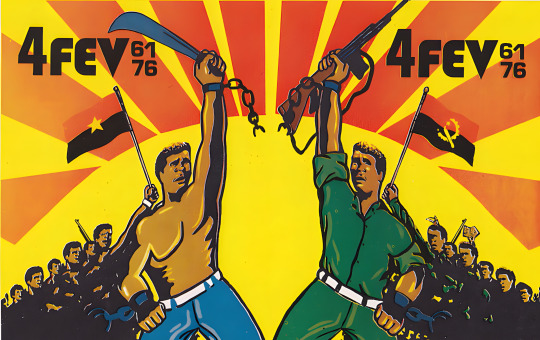
"Celebrating the 15th anniversary of the beginning of the Angolan War of Independence (1961-1974)" Angola 1976
73 notes
·
View notes
Text
Artistic exchange between Brazil and Angola aims to reclaim colonial ties
For the first time in its 73-year history, the Sao Paulo Biennial is taking artworks to the African continent with a travelling showcase in Angola. The event's curators told RFI they hope the project will highlight long-standing correspondences between Angola and Brazil, united by a shared colonial past.
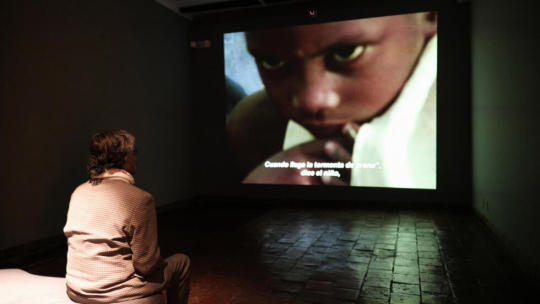
The 35th Biennial is the first to go to Africa as part of the travelling exhibitions programme established by the Sao Paulo show, one of the biggest art events in the southern hemisphere.
After touring cities in Brazil, Argentina and Bolivia, it is on display in Angolan capital Luanda until December 2024.
Brazil, which was a Portuguese colony from 1500 to 1825, was the first country to recognise Angola's independence from Portugal in January 1975.
And now, as Angola prepares to celebrate 50 years of independence, the Brazilian biennial wanted to focus on the cultural links between the South American powerhouse and the largest Portuguese-speaking country in Africa.
Continue reading.
#brazil#angola#politics#art#history#museums#brazilian politics#angolan politics#image description in alt#mod nise da silveira
18 notes
·
View notes
Note
(Re: the south africa post)
It is correct to state that decolonization/landback movements are not retaliatory in nature. However, there are some unfortunate truths you seem to be pushing aside.
-When given a choice between restitution and retaliation, the latter will invariably be chosen. You may think you're different, but if your family were slaughtered and driven from their lands, you'd likely be singing a different tune.
-Well-meaning movements are oft devoured from within by extremist elements.
This is not to speak against these movements that are doubtless well-intentioned and seek genuine positive change; at least they will likely bring about a better country before this occurs. (I also am not implying these movements are disguising their true intentions; but rather that their good intentions will end up superseded, as they always are, by those seeking revenge.)
Nor is this a defense of those who would oppose indigenous land rights/decolonization; people like that want me and my friends dead or worse. I don't want to go to Europe, but I'm smart enough to see that displacement is better than death. And I'd certainly never throw other marginalized peoples under the bus regardless of the outcome on my end.
Just lamenting the fact that there really is no good ending here, or at least none that doesn't involve mass suffering. I still support indigenous peoples' struggle, and that won't change, but I wish things didn't have to end up like this.
I completely disagree with this ask. I made a post saying "decolonization does not necessarily ends in mass suffering; here are examples where it ends in an integrated equal society" and you're straight up telling me "When given a choice between restitution and retaliation, the latter will invariably be chosen". It's like you read my post and chose just to deny everything I said for no reason other than your own lack of faith in humanity.
This is the same argument that slavery proponents said in the US, if slavery was abolished. It didn't happen. It was the same with those who supported Apartheid, they said that if South Africa ended it, it would end in a white genocide. It didn't happen. Was there inequality and cases of violence? Yes. Are there still political, social and economic issues to be solved? Yes. There was never the extreme retaliation you say, no "white genocide". It did not happen in South Africa, it did not happen in the United States, it does not happen just because. No matter how many demagogues and extremists are there, people don't want "retaliation", in general, they want to live free and plentiful lives.
So no, they're not "always taken over by extremists"
The cases where violence and expulsion indeed happen where the cases where the colonial powers attempted by all means to continue their rule, the cases where they decide to divide their colonial possesions against the will of the people there, like the French with Algeria. Those who chose the path of reconciliation always end up as more equal societies. Funny that.
It's even crazier when even countries that have experienced violent independence conflicts don't even do the same to their former colonists. Did you know, for example, that there are between half a million and a million Angolans of Portuguese descent? They have chosen to integrate to a new, independent Angola: in fact, many fought for it. And they are accepted as such.
This supposed lust for revenge you put forward as a universal experience is ridiculous.
33 notes
·
View notes
Text

Bakongo (also known as Mkongo or Mukongo). In one of the Bantu languages, Kongo, the word “Ba” means “People” while “Kongo” according to an adventure means “Hunter” while according to others it means “Gathering” or “Mountains”. There is yet to a decisive context for it. Even the term “Congo” was a term used to refer to black people who spoke “Kikongo” in Cuba, America. The Bakongo people speak Kinkongo language which also compromises of 9 other language variations for different sub-branches of the Bantu tree; for example the Kivil dialect by the north coast, the Kisansolo in the central dialect, amongst others.
The 13th – 14th century saw the creation, transition, and building of the great Kingdom of Kongo. The kingdom succession was based on voting by the noble of the land which kept the king’s lineage among royalty. In the late 14th century, what was supposed to be a quick stop for the portugese
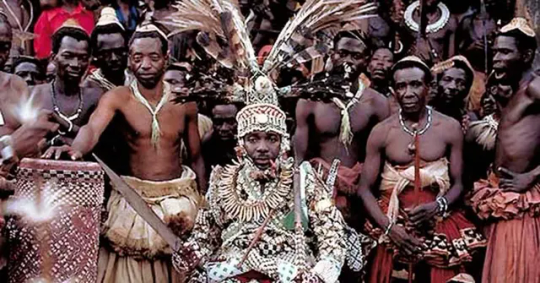
Allegedly, the Portuguese were in search of a route to India for opportunities when one Diego Cao found the river Congo. Moving south he and his companions found the people of Kongo in an organized system; valuable currency, trading relations, transport infrastructure, port settlements, and open-minded people.
The people of Kongo accepted them and even the king willingly accepted Christianity in a show of solidarity with these new people. Once a man, Chief Muanda, warned the people of the coming doom of slavery of the Bakugo clan which will destroy the kingdom, he said it will begin with the visitation of foreigners but people choose what they want to see even though he was later right. By the 19th century; the Kingdom of Kongo had completely fallen, the Bakongo people had fully divided and spread across different parts of the continent.
The Bankongo people are the third-largest group in Angola but in the 17th century, they lost a war to Portuguese during the repression. They moved throughout the continent occupying the northern regions of places like Cabinda, Congo, Angola and Zaire. In the 20th century, the Bakongo created a political party called the Union of Angolan Peoples (UPA) in an attempt to bring back all the Bakongo people, eventually, they decided an independent country filled with different tribes was much better for their society. Soon after that decision, they fought along the Ovimbundu and the Mbundu people for a better Angola.
In 1975, Angola gained its independence with a lot of Bakongo people being the faces for the win but as soon as the Mbundu people took over the ruling power there was discrimination among all three tribes. In the present time, their largest numbers are in Congo and though they’ve been through a lot, they have kept some of their cultural practices.
13 notes
·
View notes
Text

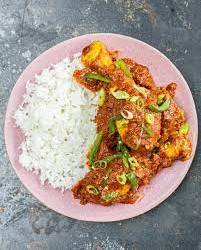
youtube

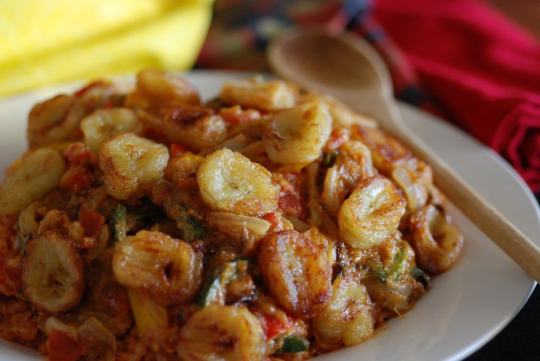
Celebrate Your Cuisines...
3 notes
·
View notes
Text
Unveiling the Essence of Lusophone: A Journey Through Language and Culture
In a world of diverse languages and cultures, the term "Lusophone" holds a unique significance beyond mere linguistic connections. Derived from "Lusitania," the ancient Roman province that encompassed parts of modern-day Portugal and Spain, "Lusophone" refers to the countries, communities, and cultural spheres united by the Portuguese language. This linguistic thread binds regions with rich histories, intricate traditions, and shared aspirations, creating a fascinating tapestry that spans continents and epochs.
The Lusophone Network: A Global Perspective
The Lusophone community is not limited to Portugal and its immediate neighbors; it encompasses a constellation of countries and territories with historical ties to Portuguese colonialism and exploration. Prominent members include Brazil, Mozambique, Angola, Cape Verde, Guinea-Bissau, São Tomé and Príncipe, and East Timor. Additionally, regions like Macau in China and Goa in India, which bear the marks of Portuguese influence, contribute to the intricate fabric of Lusophone heritage. This sprawling network demonstrates the far-reaching impact of Portuguese exploration and colonization.
The Power of Language as a Cultural Link
The Portuguese language is the cornerstone of the Lusophone identity, creating a shared bond that transcends borders and historical legacies. This linguistic connection enables meaningful communication, exchange of ideas, and artistic collaboration among nations that might otherwise have little in common. It fosters a sense of unity and familiarity, allowing Lusophone communities to appreciate each other's cultural nuances and engage in cross-cultural dialogue.
Cultural Diversity within the Lusophone World
While the Lusophone community shares a linguistic foundation, its diversity is evident in its myriad cultural expressions. Each member nation brings its unique traditions, music, cuisine, and ways of life to the collective table. From the vibrant rhythms of Brazilian samba and the rhythmic beats of Angolan kuduro to the melancholic melodies of Portuguese fado, the Lusophone world pulsates with a kaleidoscope of artistic diversity. This cultural mosaic is a testament to the resilience and adaptability of Lusophone societies as they have evolved.
Historical Legacy and Contemporary Dynamics
The historical legacy of colonialism is a complex facet of the Lusophone identity. While it has left indelible marks on societies and cultures, it has also been a source of introspection, reconciliation, and growth. Many Lusophone countries have embraced their diverse heritage and worked to address past injustices, fostering a spirit of unity and cooperation. These nations have navigated their unique paths to independence and development, often overcoming challenges through collaboration and shared experiences.
Lusophone in the Modern Context
In the modern world, the concept of Lusophone continues to evolve. The Portuguese language is a gateway to international partnerships, trade, and diplomacy, providing a platform for Lusophone nations to engage with the global community. Organizations like the Community of Portuguese Language Countries (CPLP) facilitate cooperation among member states, promoting cultural exchange, education, and sustainable development. This collaborative spirit extends to various fields, including science, technology, and the arts, reinforcing the ties that bind the Lusophone community.
Preservation and Innovation: Balancing Tradition and Progress
Preserving cultural heritage while embracing innovation is a delicate balancing act for Lusophone nations. A forward-looking approach to economic and social development complements efforts to safeguard traditional practices, languages, and art forms. For example, countries like Brazil have blended their rich cultural heritage with advancements in technology and industry, leading to a unique fusion of tradition and modernity.
The term "Lusophone" encapsulates far more than a shared language; it embodies a living testament to the interplay between history, culture, and human connections. The Lusophone community showcases the potential for unity amidst diversity, with a linguistic thread that spans continents and fosters mutual understanding. While rooted in a complex history, the Lusophone world is marked by resilience, creativity, and collaboration. As it navigates the complexities of the modern era, the Lusophone identity remains a vibrant tapestry that weaves together the stories, dreams, and aspirations of diverse peoples who share a common bond through the Portuguese language.
2 notes
·
View notes
Text
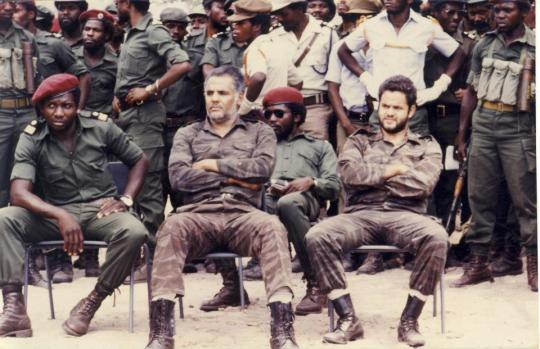
October 31, 1987 South Africa's Angolan ally in the Border War - The National Union for the Total Independence of Angola, known by its Portuguese acronym UNITA, captured two Cubans after shooting down their MIG-23 jet over Angola's eastern province of Moxico. Cuba, in an unprecedented public admission, confirmed the incident identifying the Cubans as Lt. Col. Manuel Rocas Garcia and Capt. Ramos Cazados. Photo courtesy of the Russian Angolan Veterans Union. Story for the South African Legion Peter Dickens
3 notes
·
View notes
Text
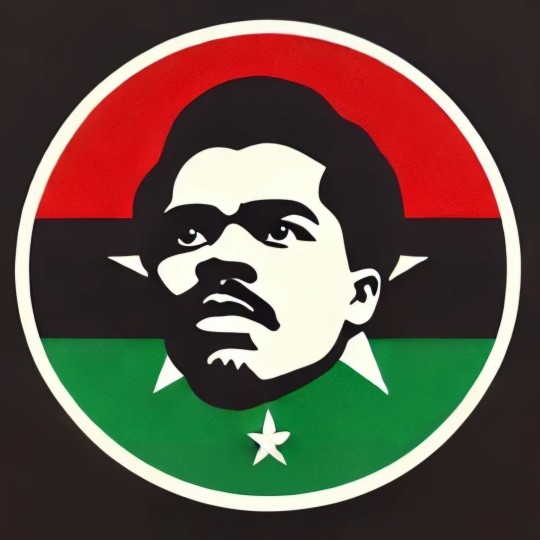
The Fall of the Berlin Wall and African Liberation: A Garveyite Perspective on Global Power Shifts, Neo-Colonialism, and the Unfinished Struggle for Black Sovereignty
The fall of the Berlin Wall on November 9, 1989, marked the symbolic end of the Cold War and the collapse of Soviet influence in Eastern Europe. This global event had profound implications not only for Europe but also for Africa, as it signaled the decline of socialist support for African liberation movements, the rise of unchallenged Western capitalism, and the acceleration of neo-colonialism across the continent.
From a Garveyite perspective, the fall of the Berlin Wall was not a victory for true African liberation—it was a moment that exposed Africa’s continued dependency on foreign superpowers and the lack of self-sufficient economic and military structures needed to withstand Western neo-imperialism. Marcus Garvey’s ideology warns that African freedom can never be dependent on the shifting tides of global politics; it must be built through Pan-African unity, economic self-reliance, and military self-defense.
This analysis will explore:
The Cold War’s impact on Africa and how superpower rivalries shaped African liberation movements.
How the fall of the Berlin Wall weakened African nations and increased Western economic control.
The rise of neo-colonialism and U.S.-led globalization in Africa after 1989.
How Garveyism provides the solution for real African independence beyond the East-West struggle.
1. The Cold War and Its Impact on African Liberation
For nearly four decades, Africa was caught between the superpower rivalry of the United States (capitalism) and the Soviet Union (socialism).
A. Africa as a Battleground for Cold War Ideologies
Many newly independent African nations, struggling with underdevelopment and instability, sought support from either the U.S. or the USSR.
The Soviet Union supported African liberation movements, providing weapons, training, and financial aid to fight colonial rule.
The U.S. and Western allies backed puppet regimes and right-wing dictatorships that aligned with their economic and military interests.
Example: The Soviet Union provided military support to Angola’s MPLA, Mozambique’s FRELIMO, and South Africa’s ANC, while the U.S. and apartheid South Africa funded UNITA and RENAMO to destabilize these governments.
B. How the Cold War Strengthened African Liberation Struggles
The USSR’s backing of revolutionary movements gave African nations a counterbalance to Western dominance.
Cuba played a major role in anti-colonial struggles, sending 36,000 troops to Angola to fight against apartheid South African forces.
African leaders such as Kwame Nkrumah (Ghana), Julius Nyerere (Tanzania), and Thomas Sankara (Burkina Faso) implemented socialist-inspired policies that sought self-sufficiency.
Example: The Battle of Cuito Cuanavale (1987–88) in Angola, where Cuban and Angolan forces defeated apartheid South Africa, was a turning point that accelerated the fall of white minority rule in Southern Africa.
Key Takeaway: During the Cold War, Africa had an alternative to Western neo-colonialism. The fall of the Berlin Wall ended that counterbalance, leaving Africa exposed to full Western domination.
2. The Fall of the Berlin Wall: How It Affected Africa
With the collapse of the Soviet Union (1991) and the fall of the Berlin Wall (1989), Africa lost a key source of support for anti-imperialist struggles. This led to three major consequences:
A. The Withdrawal of Socialist Support Weakened African Nations
Without Soviet aid, many African governments lost financial and military backing.
Cuba could no longer send troops or resources to African liberation struggles.
African socialist experiments collapsed, leading to economic crises and internal conflicts.
Example: The end of Soviet support led to economic collapse in Angola, Mozambique, and Ethiopia, forcing these nations to turn to Western financial institutions (IMF, World Bank) for aid, which led to deep debt and structural adjustment policies.
B. The Expansion of Western-Controlled Globalization in Africa
With socialism weakened, the U.S. and Europe expanded economic control over Africa, forcing nations to adopt pro-capitalist policies.
The IMF and World Bank imposed Structural Adjustment Programs (SAPs), which forced African governments to cut public services, privatize industries, and open markets to foreign investors.
Western multinational corporations took advantage of Africa’s economic instability, gaining control over natural resources and industries.
Example: In the 1990s, the IMF forced Ghana to privatize its industries and cut social spending, leading to worsening poverty despite economic “growth.”
C. The Rise of Western-Controlled Regime Change in Africa
The fall of the Berlin Wall gave the U.S. and NATO free reign to overthrow or manipulate African governments without fear of Soviet intervention.
Western-backed coups increased, targeting African leaders who resisted neo-colonial control.
The U.S. used “democracy promotion” as a cover for regime change, while maintaining economic control.
Example: Thomas Sankara of Burkina Faso was assassinated (1987),with Western backing, because they resisted U.S.-led globalization.
Key Takeaway: After 1989, Africa was left defenceless against Western capitalism, neo-colonial exploitation, and foreign economic control.
3. The Garveyite Critique: Why the Fall of the Berlin Wall Was NOT a Victory for Africa
From a Garveyite perspective, the fall of the Berlin Wall and the collapse of the Soviet Union did not bring freedom to Africa—it increased neo-colonial domination by the West.
A. Africa Was Still Economically Dependent on Foreign Powers
Even after independence, African nations did not control their own economies—Western banks, corporations, and foreign governments did.
Marcus Garvey taught that true liberation requires economic self-reliance, not just political independence.
Example: Even today, 14 African nations still use the CFA Franc, a currency controlled by France.
B. No Unified African Military Defence Against Western Imperialism
Without Soviet backing, Africa became vulnerable to the U.S. and NATO military interventions.
Garvey envisioned a strong, self-sufficient African military, but Africa instead remained divided and dependent on foreign security.
Example: The 2011 NATO bombing of Libya, which overthrew Gaddafi, showed that Africa had no defence against Western military intervention.
C. The Absence of a United States of Africa Allowed Foreign Exploitation
Garvey believed in a single, powerful African nation-state, not separate, weak countries easily controlled by foreign interests.
The African Union (AU) remains politically weak, with no real power to challenge Western economic control.
Example: Despite Africa having vast natural resources, foreign corporations and banks still control African industries, from oil in Nigeria to cobalt in the Congo.
Key Takeaway: The collapse of the Soviet Union left Africa politically and economically vulnerable, proving that true liberation requires complete independence from all foreign powers—not just from one side of the Cold War.
4. The Garveyite Solution: How Africa Can Achieve True Liberation
To reverse the damage done after the fall of the Berlin Wall, Africa must:
Nationalize Resources – African countries must take back control of oil, minerals, and agriculture from foreign corporations.
End Foreign Economic Control – Africa must break free from IMF, World Bank, and Western trade policies that keep it in debt.
Create an Independent African Military – Africa must build its own defence system to prevent the U.S. and NATO interventions.
Unify Under a Single African Government – A United States of Africa, as Garvey envisioned, is the only way to resist Western neo-colonialism.
Strengthen Pan-African Trade – Africa must trade within its own borders rather than relying on Europe, the U.S., or China.
Final Takeaway: The fall of the Berlin Wall was not a victory for Africa—it was a warning that Africa must become self-reliant, or it will remain under foreign control forever.
Conclusion: The Struggle for True African Independence Continues
The post-1989 world order made Africa more vulnerable to neo-colonialism than ever before. Today, Africa must:
Reject all foreign economic domination.
Unify into a single powerful African nation.
Build its own military and financial institutions.
As Marcus Garvey warned, political freedom without economic and military power is an illusion. Africa must finish the revolution—only then will true Pan-African liberation be achieved.
#black history#black people#blacktumblr#black tumblr#black#pan africanism#black conscious#africa#black power#black empowering#african culture#Garveyite#garveyism#marcus garvey#African Liberation#economicfreedom#self determination#UnitedStatesOfAfrica#EndNeoColonialism#blog
23 notes
·
View notes
Text
This sort of tweet really annoys me with its how, despite it's supposedly "progressive" viewpoint, it distorts and mangles actual history in order to create a neater narrative that actually weakens one's ability to understand and therefore change the world
Like Apartheid South African and Contemporary Israel have a lot in common; both are white supremacist apartheid Settler States that are intimately tied to and heavily supported by international Imperialist Capitalism (as headed by the USA). They also enjoyed friendly relations with each other and regularly shared ideas and technology, so you have active mutual influence on top of natural convergent evolution. Comparison, as well as contrast, between each regime is a useful way to understand how these sorts of systems function. And yes, observing past trends in one system can help us predict the future of another
But like South Africa and Israel also have a vast number of differences; from their specific relationship with future designs for the peoples they oppressed, to the state of their regional neighbours as well as the overall extent to which other imperialists were willing to openly support them. And these differences in circumstance lead to significant differences in policy.
Like the fact of the matter is this tweet is incredibly misleading; it implies the Apartheid regime of South Africa somehow went berserk in the final years of it's existence when like this political intervention in their northern neighbours had been South African policy since the 1960s. Even before the independence of Angola or Zimbabwe (as well as Mozambique) the South African government had invested considerable sums of money and manpower into propping up the Portuguese and Rhodesian White Settler regimes against the pressure of Anti-Imperial Socialist resistance movements. After the end of Portuguese rule in Africa in 1974 (as their colonial wars drove them bankrupt and exacerbated domestic problems to the point that the Fascist regime found itself overthrown by a Leftist military coup) the South Africans then switched to supporting armed movements of local reactionaries and compradors like UNITA in Angola (which already had a long history of collaboration with the Portuguese) and later RENAMO in Mozambique (whose initial formation was one of the Rhodesian CIO's last significant achievements).
South African attempts to overthrow the Angolan revolutionary government, launching several major offensives with their own ground troops alongside their UNITA puppets while offering plentiful supply, funding and air support to UNITA outside of this, had been policy for as long as there was an Angolan Revolutionary Government to overthrow. And while their had less luck finding useful allies to destabilise Zimbabwe, their cross-border raids were simply an extension of their previous support for Rhodesia. Meanwhile their violations of Zambian sovereignty also were a consistent policy dating back to the 60s due to the Zambian Socialist government's mostly consistent support for the Anti-Imperial resistance movements of Southern Africa. While a deterioration of their relationship with Botswana was a later development, this was mainly a result of political pressure from both other African nations and their own citizens for the Bourgeoisie Botswanan government to stop collaborating with South Africa and to tolerate the presence of anti-apartheid fighters in their territory.
The whole "set-up a puppet government in Namibia" is the most misleading part of all. It implies that Namibia was some sort of independent nation they tried to subvert, and not a colonised territory they outright occupied (de facto since 1922, de jure since 1946; either way since before even the formal inauguration of nation-wide Apartheid in 1948). The attempts to set up a puppet government in Nambia were a direct de-escalation of South African involvement in the territory, prompted by the costly resistance offered by SWAPO and their Angolan Allies. Like if anything the very last years of Apartheid saw a de-escalation of South Africa's aggressive foreign policy, as the social and economic costs of their multiple intense wars had weakened the country and brought the regime close and closer to collapse while even among the Afrikaner Conservatives there was a growing recognition that some sort of compromise with Black Africa was necessary to secure any sort of survival.
And like there were very real material reasons for this, such as the lesser extent of open US support or the inherent contradiction of keeping the indigenous Africans as an oppressed pool of cheap labour which Israel avoided by tending towards outright genocide of Palestinians. It's not like the South African Apartheid regime was morally any better than Israel, just materially different. But these differences must be remembers if we want any chance of actually understanding the situation, instead of just mechanistically applying 1:1 comparisons because it makes an easier story. The nuances of Southern Africa must be appreciated if we want to truly appreciate the history of human struggle against oppression; we can't reduce it to a footnote on whatever conflict it's currently popular to perform activism for.
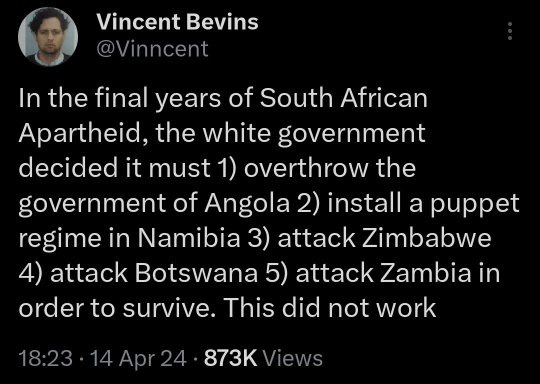
4K notes
·
View notes
Text
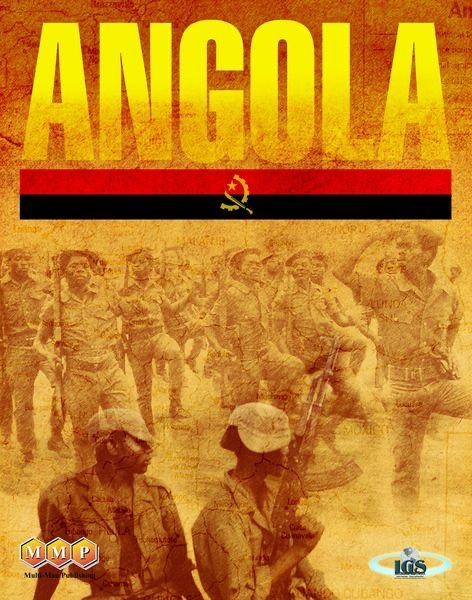
The Angolan Civil War, beginning at the time of the country’s independence from Portugal in 1975, was a 27-year struggle involving the deaths of over 500,000 soldiers and civilians. Initiated at the height of the Cold War, pro- and anti-communist forces in Angola set the stage for a proxy fight between the US and the USSR. Angola is in economic and social turmoil with a massive refugee crisis and millions of landmines impeding farming practices.
Rich in diamonds and oil, Angola was one of the last African nations to receive independence from a European power. On April 25, 1974, a Portuguese military coup d’état protesting the country’s colonial practices overthrew the regime. The combined forces of the Popular Movement for the Liberation of Angola, the National Front for the Liberation of Angola, and the National Union for Total Independence of Angola created a transitional government with the Alvor Accord of 1974.
The government had disintegrated, and with aid from the USSR and the Cuban military, the Marxist-oriented MPLA under the leadership of José dos Santos had wrested control of most of Angola. Governments from the US, Brazil, and South Africa funded UNITA, providing munitions, intelligence reports, and mercenaries.
A temporary agreement known as the Bicesse Accords was reached. The agreement mandated a new national government and army, along with Angola’s first multi-party elections. MPLA candidate José dos Santos won 49% of the popular vote in the election compared to 40% for UNITA candidate Dr. Jonas Savimbi. When Savimbi disputed the outcome, UNITA resumed guerilla war against the MPLA.
The UN Security Council passed Resolution 864 placing an embargo on petroleum and munitions shipments to UNITA. UNITA continued military operations until Savimbi was killed in an ambush. UNITA has since been a formidable political party in Angolan politics. #africanhistory365 #africanexcellence
0 notes